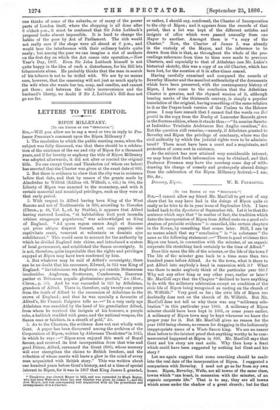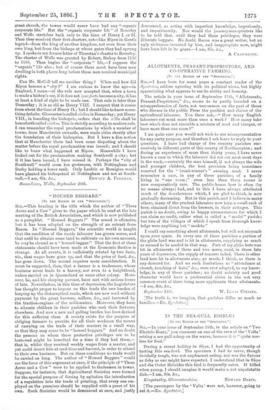[To THE EDITOR OF THE "SPECTATOR."]
cannot allow my friend Mr. MacColl to get out of any share that he may have had in the doings of Ripon quite so easily as he tries to do in your issue of September 18th. I have looked back to the Spectator of September 4th. Let it be that the sentence which says that" in matter of fact, the tradition which dates the incorporation of Ripon from Alfred rests on a good sub- stratum of probable evidence" is cancelled, like certain chapters in the Koran, by something that comes later. Still, I can by no means admit that my " conclusion " is "in substance" the same as the following statement :—" There is good evidence that Ripon can boast, in connection with the minster, of an organic corporate life stretching back certainly to the time of Alfred."
Does this mean the life of the minster, or the life of the town ? The life of the minster goes back to a time more than two hundred years before Alfred. As to the town, what is there to put Alfred into anybody's head in connexion with it ? What was there to make anybody think of the particular year 886 ? Why not any other king or any other year, earlier or later ? Mr. MacColl says that the Chapter "declined to have anything to do with the millenary celebration except on condition of the civic life of Ripon being recognised as resting on the church of St. Wilfrith." Very good so far ; the civic life of Ripon un- doubtedly does rest on the church of St. Wilfrith, But Mr. MacColl does not tell us why there was any "millenary cele- bration" in this particular year 1886. A millenary of Ripon minster should have been kept in 1661, or some years earlier. A millenary of Ripon town may be kept whenever we know the proper year for it. But Mr. MacColl gives no reason for the year 1886 being chosen, no reason for dragging in the ludicrously inappropriate name of a West- Saxon king. We are no nearer than before to the faintest proof that anything worthy to be com- memorated happened at Ripon in 886. Mr. MacColl says that Gent and his story are cast aside. Why then keep a feast which could have been suggested by nothing but Gent and his story?
Let me again suggest that some searching should be made into the real date of the incorporation of Ripon. I suggested a comparison with Beverley. I need not go so far from my own home. Ripon, Beverley, Wells, are all towns of the same class, towns which "can boast, in oonnexion with the minster, of an organic corporate life." That is to say, they are all towns which arose under the shadow of a great church ; but for that
great church, the towns would never have had any "organic corporate life." But the "organic corporate life" of Beverley and Wells stretches back only to the time of Henry I. or II. Then they received their first charters, not—like Ripon in Gent's legend—from the king of another kingdom, not even from their own king, but from the bishops at whose gates they had sprung up. I spoke in my former letter of Thurstan's charter to Beverley. The charter of Wells was granted by Robert, Bishop from 1136 to 1166. Then begins the " corporate " life,—I suppose the " organic " life also ; but of course there must have been men dwelling in both places long before those men received municipal rights.
Can Mr. McColl tell me another thing ? When and how did Ripon become a "city 9" I am curious to know the age—in England, I mean—of the rule now accepted that when a town is made a bishop's see, if it does not ipso facto become a city, it has at least a kind of right to be made one. That rule is later than Domesday ; it is as old as Henry VIII. I suspect that it comes from about the time of Henry IL; but I should like to know some- thing definite. Gloucester is called civitas in Domesday; yet Henry VIII., in founding the bishopric, orders that the villa shall be henceforth called civitas. This is strictly according to modern rule. I can remember the royal proclamations by which a number of towns, from Manchester onwards, were made cities shortly after the foundation of their bishoprics. Bat I have a dim notion that at Manchester there had been some disputing about the matter before the royal proclamation was issued; and I should like to know what happened at Ripon. Meanwhile I have looked out for the proclamation making Sonthwell a city ; but if it has been issued, I have missed it. Perhaps the "city of Sonthwell" would seem too grotesque, with Nottingham and Derby holding a lower rank. Only Leofric or Remigius would have planted his bishopstool at Nottingham and not at South-



































 Previous page
Previous page